Click Here to Download PDF Version
Telehealth Newsletter
Official Newsletter of Tamil Nadu Chapter of Telemedicine Society of India
|
What is New? The executive committee (EC) of Telemedicine Society of India has for the last few months been working on amendments of the society’s bye-laws. In the last 20 years so much seems to have changed including the term telemedicine. First Medicine was replaced with health (Tele-Health) and then Tele was replaced with Digital. The amendments will be circulated by the secretary of the society (Dr.Murthy) and all members should try and send their input so that the new bye-laws are all inclusive. We have published the link here of the bye-laws for the convenience of the members and for their feedback. The Special General Body that was called for this purpose had only 30 members in a society of over 700 members. The month of July also saw the physical meeting of the EC at Kochi to discuss these amendments plus review the arrangements for the forthcoming annual meeting in November at Kochi. At Kanpur, Dr. Saroj Mishra put up a great meeting on AI in healthcare and at Srinagar Dr. Farooq Ahmad Wani celebrated the Digital Week – reports are enclosed. Thank You |
Draft Bye Laws of TSI
Article I: Name of the Society
The name of the of the society shall be “Telemedicine Society of India” herein after referred to as “TSI” or the “Society”; an independent scientific body operating on a notfor-profit basis and not aligned to any particular political party or religion.
Article II: Title
These byelaws shall be called the byelaws of the Telemedicine Society of India.
Article III: Office of the society:
1. The registered office of the society shall be situated in Room No.303, 2nd Floor, School of Telemedicine & Biomedical Informatics (STBMI), Sanjay Gandhi Post Graduate Institute of Medical Sciences (SGPGIMS), Raibareli Road, Lucknow- Uttar Pradesh226014, India.
Article IV: Status of Society
1. The Society shall be juristic person and shall have a perpetual succession and can sue, and also be sued, in its own name through the person appointed by the TSI for the purpose.
Article V: Aims & objectives
1. The aims and objectives of the Society will be in furtherance of the activities it wishes to undertake in the field of digital health, and any ancillary activity which has to be accounted for the smooth and continued functioning of the Society. The specific objects have been outlined as below:
(i). To promote and encourage application of Telemedicine along with development, advancement and research in the field of Telemedicine/Telehealth/eHealth/Digital Health (which terms may be used interchangeably in different contexts) and associated fields; for improvement in the overall Healthcare access.
(ii). To promote, increase awareness on matters related to telemedicine, via all means and media which exist currently, or may be developed in future.
(iii). To encourage and promote application of telemedicine technology in clinical care, education and research in the health sector. The Society may work with any person for promotion of corporate social responsibilities of the companies, under the law.
(iv). Fostering networking and collaboration among interest groups in telemedicine technology and professionals from different streams of science, health care providers, policy makers, NGOs and industry.
(v). To promote training of students, health professional, research fellows and technicians in various aspects of telemedicine, on free of cost or suitable arrangement to meet out the expenses as the EC decides Also, to co-ordinate with academic institutions and premier think-tanks in the TM/associated field, industry associations, regulatory authorities, (like National Medical Commission/DCI, AICTE, DOEACC, as the case maybe); in developing curriculum for training courses and incorporating appropriate modules in the healthcare and associated training programmes.
(vi). To conduct regular meetings, symposia, seminars on matters related to digital health.
(vii). Spearheading the development of appropriate clinical and industry policies and standards, in view of adoption of and integration with Telehealth.
(viii). Disseminating knowledge in telemedicine field by publishing brochures, periodicals, and journals, through Society’s own website, or third party literature.
(ix). To work in close collaboration with scientific organizations and the industry in development and implementation of innovative products & services related to Telehealth. Organizing trade exhibitions during annual meetings of the society or at any opportune event.
(x). “To develop, co-ordinate and conduct knowledge and capacity building exchange programmes, with national/international organizations engaged in activities in the field of telemedicine
(xi). To work towards getting recognized as an accreditation body for Telemedicine/Telehealth/eHealth etc.
(xii). Spearheading or collaborating in the development of appropriate clinical and industry policies and standards, in view of adoption of and integration with Telehealth
(xiii). Facilitate Individuals/organisations to start/improve TM practice with proper networking and necessary guidance
Article VI: Definitions
1. In the interpretation of the Byelaws, unless there is something inconsistent or repugnant with the subject or context, the following words shall have the meaning given as hereunder:
(i).“The Society” shall mean the TSI Society having its registered address at School of Telemedicine, SGPGIMS, Raibareli Road, Lucknow
(ii).“Member” shall mean any type of Member as defined in article VII, whose application for Membership: has been accepted in accordance with the Byelaws and is a Member paying the appropriate subscription charge(s) as applicable to their category. For the purposes of proceedings under the Societies Registration Act, 1860 (the Act), no Member shall be entitled to vote or be entitled to the benefits of membership, if their subscription at the time of voting have been in arrear for a cumulative period of 2 months.
(iii).“General Body” shall mean the general body of the Society consisting of all the members of the Society. The General Body of the Society shall be comprised of President, Vice President, President-elect, Treasurer, Members of the Executive Committee and other Patron, Corporate, Professional, Startup and Academia Members.
(iv).“Executive Committee” (EC) is same as the Governing Body of the Society defined by the Act and shall mean the Committee that is constituted in accordance with Article IX of these Byelaws and to whom the management and affairs of the Society are entrusted. The Society shall have the following officers, who shall be the members of the Executive Committee – President, President Elect, Vice President, Immediate Past President, Hony.Secretary, Jt.Secretary,Treasurer and such other nominated members of the Society as confirmed during the AGM. The term of an EC will be for a period of 2 years.
One Day National Workshop on Telemedicine & Artificial Intelligence held at the IIT Kanpur Outreach Centre in NOIDA
Prof. S. K. Mishra, MS, Dip NB, FAMS, FACS
Distinguished Visiting Professor,
Gangwal School of Medical Science and Technology,
Indian Institute of Technology, Kanpur
One day national workshop on Telemedicine & Artificial Intelligence was held on 2nd July 2022 at the IIT Kanpur Outreach Centre in NOIDA. This event was organized by newly launched Gangwal School of Medical Science & Technology, IIT, Kanpur in hybrid mode involving digital health policy makers from government, Telemedicine practitioners from medical community both from public and corporate hospitals and academics from technological institutions from country and overseas.
The workshop was inaugurated by Dr. R S Sharma, CEO, National Health Authority, Government of India who enlightened the participants on the activities undertaken at National level to facilitate rapid adoption on digital technologies for health in the care delivery pathway ensuring universal access to health care services. Earlier Prof. Ashutosh Sharma, former Secretary DST and currently Professor at IIT Kanpur welcome the chief Guest, dignitaries, invited speaker and participants. Professor Abhay Karandikar, Director, IIT Kanpur in his address spoke about the vision of IITK in setting up the School of Medical Science and Technology and various Centres of Excellence in the campus. He stressed the relevance of medical technology in advancing modern healthcare in particular and the need for self-reliance in making quality health services affordable and accessible to billions of population of not only India but low and middle income countries around the world.
The scientific sessions were divided into three sections, the first section covered detailed deliberation on policy and procedures on digital health by Mr. Vikram Pagaria from National Health Authority. The second section addressed the telemedicine technology and it’s applications in various domains like Radiology, Pathology, Surgery, Ophthalmology as practiced in public and corporate hospitals were addressed by medical experts. The National Telemedicine System using e-Sanjeevani was presented by C-DAC, Mohali in great detail. The future plan of development of Version 2.0 of e-Sanjeevani was announced which will have options of integration of third party medical devices in particular point-of-care diagnostics based on IoT technology. The third section focused on application of artificial intelligence addressing it’s usage in remote patient monitoring in ICU setting, Mental health, rural telehealth care system etc.
The concluding Round Table had a brain storming session involving more experts in additions to session experts to develop strategy and vision of developing actions plan in the upcoming centres of excellence in telemedicine and AI.
The list of Speakers include; Mr. Vikram Pagaria, National Health Agency, Govt. of India, Prof. K Ganapathy, Apollo Telehealth Network Foundation, Chennai, Mr. Praveen Srivastava, Associate Director & Head, Health Informatics Dept., C-DAC, NOIDA, Dr. Suchita Markan, Scientist E, Medical Device and Diagnostics Mission Secretariat, Indian Council of Medical Research, Rajesh Kaushish, Asst. Director, Dept. of Health Informatics & Medical Electronics, Center for Development of Advanced Computing, (C-DAC), Mohali, Dr. Arjun Kalyanpur, Chairman, Tele-radiology solutions, Bangalore, Dr. R Kim, Director, Arvind Eye Hospital System, Madurai, Dr. Sangeeta B. Desai, Head, Dept. of Pathology, TMH, Mumbai, Prof. S K Mishra, Distinguished Visiting Professor, Gangwal School of Medical Science & Technology, IIT Kanpur, Dr. Vijayakumar Chinnadurai, Scientist F. Cognitive control and machine learning center, INMAS Delhi, Prof. T K Srikanth, eHealth Research Center, IIIT, Bangalore Tele-mental Health Mission Task Force, MoH&FW, Govt. of India, Dr. Raghu Dharmraju, President, ARTPARK (AI & Robotics Technology Park)@ IISc, Bengaluru, Dr. Dileep Raman, Co-founder, Cloud Physician, Bengaluru, Dr. Presanna Desikan, University of Minnesota, USA, Mr. Vimal, Wakhlu, Former CMD, TCIL, DoT, Govt. of India & Vice President, ITU-APT Foundation, Prof. Sunil Shroff, Sr. Consultant Urology and Renal Transplant Surgeon , Madras Medical Mission, Chennai & President, Tamil Nadu state Chapter, TSI, Editor, TSI News Letter, Prof. P K Pradhan, Dept. of Nuclear Medicine, Nodal Officer, SGPGI, Lucknow Telemedicine Programme & President, Telemedicine Society of India, Prof. Anjali Mishra, Professor, Dept. of Endocrine Surgery, Member, SGPGI.
The workshop highlighted the necessity of telemedicine and AI in the health system in the country. In an effort, several govt. policies over the past couple of years led by the National Health Authority have paved the path for changing Indian healthcare through the advancement of AI and Telemedicine in healthcare.
In view of the inadequate healthcare, the speakers deliberated the below mentioned aspects:
The necessity of the work plan to transform the digital structure in the rural areas is devoted to developing telemedicine to provide quality healthcare services locally and at lower costs.
Artificial intelligence also plays a significant role in diagnostics and digital patent evolutions. An analysis of health-related data collected and measured by digital devices. AI-based systems in performing medical work in specializations including radiology and pathology are becoming increasingly prevalent and desirable in preventative medicine in the Healthcare domain.
Digital pathology plays a vital role in deep learning for identifying the target of interest. Also, highlighted the challenges in digital pathology image analysis. The nature of diagnostics has rapidly changed owing to an explosion in the availability of patient data for disease diagnosis.
Digital technologies in current surgical practices & potential AI contribute a new development to core the subfield of AI reviewed and identified the key concept and techniques within AI that are driving innovation across industries. AI has the potential to revolutionize the way surgery is taught and practiced with the future optimized for the highest quality patient care.
The guidelines of telemedicine were discussed and how to overcome the challenges like ethical concerns and lack of infrastructure in rural regions. Reimagining the healthcare industry by embracing telemedicine and AI.
The workshop concluded successfully achieved the aim by the valuable prospects from attendees. A compendium document will be developed in a fortnight time with further inputs with well laid down guidelines for the future activity at the Centres of Excellence on Telemedicine and Artificial Intelligence.
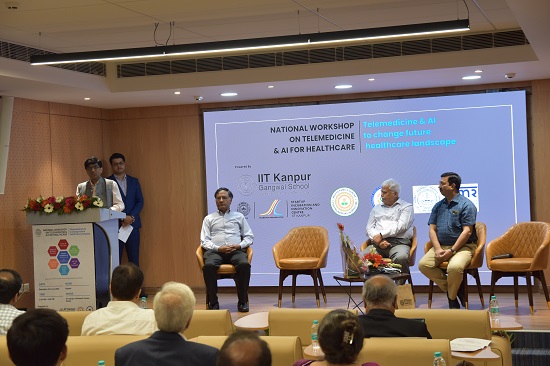
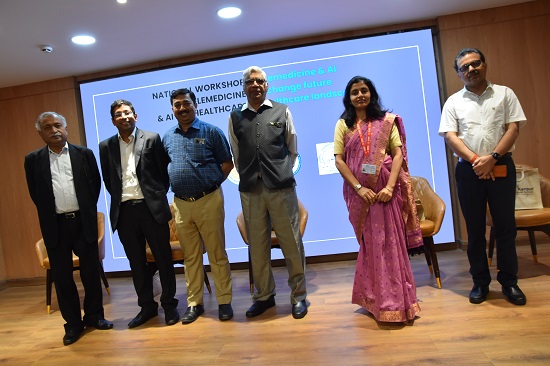
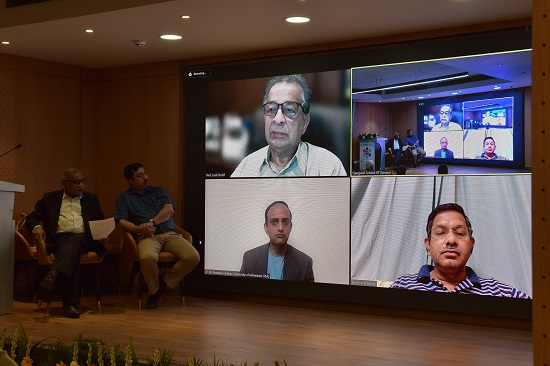
At Srinagar – SKIMS Celebrates Digital Week 2022
The department of Electronics & Communications/ Information & Technology and Hospital Administration SKIMS celebrates digital week showcasing various digital services at SKIMS.
Director SKIMS & Ex-Officio Secretary to Government, Prof. Parvaiz Ahmad Koul while speaking on the occasion emphasized for making all the services available in the hospital On-line to benefit patients as well as to enhance efficiency, transparency,accountability and accessibility, which are embedded with digital system and services , he said. He appreciated the department of E&C/IT, Hospital Administration for taking initiatives in this direction and making some of the services digital end-to-end in the hospital.
On the First day of the programme, a review was taken in the SKIMS Auditorium on the implementation of various digital services in the Administration of SKIMS like e-Office, e-Tendering, JKPaysys and other on-line services in these areas and also hands-on training on e-office implementation in un-covered areas of SKIMS was organized.
On the occasion Additional Director SKIMS & EOSSG (Mr. Gulzar Ahmad Shabnum), HOD Endocrinology (Prof. Bashir Ahmad Laway), Medical Superintendent (Prof. Farooq Ahmad Jan), Superintending Engineer E&C/IT, Er. Farooq Ahmad Wani) and Superintending Engineer Mechanical, Er. Muzaffar also addressed the audience and highlighted the importance of e-services.
The programme was attended by the officers/officials of General Administration, Hospital Administration, Materials Management, Finance & Engineering departments.
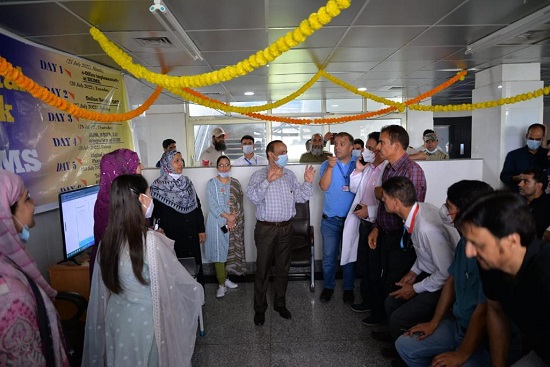
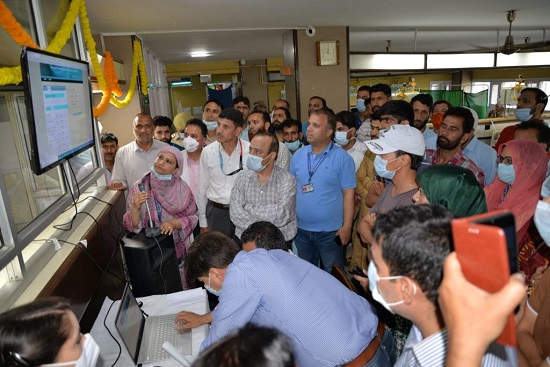
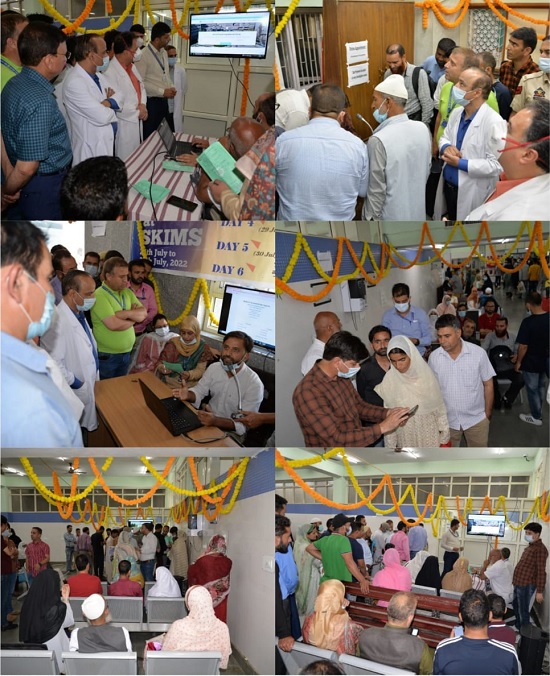
Issued through,
PR Office SKIMS
Namma Bengaluru Award for Dr. Bhaskar
Dr. Bhaskar received the prestigious ‘Namma Bengaluru Award’ under the Health care professional of the year 2021 category – recognising the service during the Covid 19 pandemic.
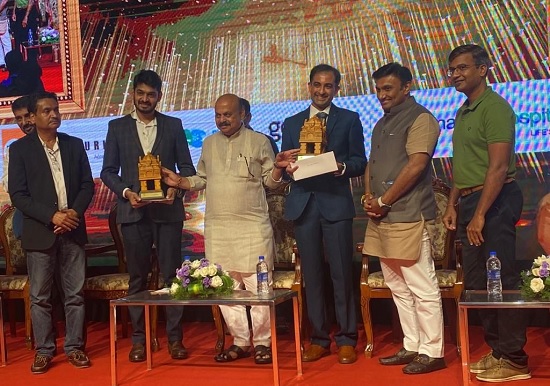
Telemedicine – News from India & Abroad
New Discovery on Mental Illness Indicators Using the AI
New research may lead to early diagnosis of devastating conditions such as Alzheimer’s disease, schizophrenia and autism — in time to help prevent and more easily treat these disorders, as done by Georgia State University’s TReNDS Center…..Readmore
Artificial Intelligence to Diagnose Birth Defects in Fetal Ultrasound Images
In a new proof-of-concept study led by Dr. Mark Walker at the University of Ottawa’s Faculty of Medicine, researchers are pioneering the use of a unique Artificial Intelligence-based deep learning model as an assistive tool for the rapid and accurate reading of ultrasound images….Readmore
Neuroendovascular Robotics Improves Safety of Complex Procedures
Through robotics, stroke surgery and other neuroendovascular procedures could be made safer and easier. A new multi-articulated, self-steering microcatheter for neuroendovascular surgery has the potential to increase technical precision….Readmore
Can Artificial Intelligence Help Predict Future Impacts of Coronavirus?
Developing Artificial Intelligence (AI) can help forecast the future impacts of the coronavirus, its variants and other evolving viruses, suggests a new study. The National Institutes of Health have awarded Michigan State University….. Read More
Click here to Become a Member of Telemedicine Society of India
Telemedicine Practice Guidelines – A Foundation Course for RMPs by TSI Faculty
To know more about the Telemedicine Foundation Course click on the link below:
https://tsitn.org/tpg-course/
TN – TSI invites all the TSI Chapters and Members to submit information on their upcoming Webinar or Events (50 words), News related to Telemedicine (200 words) or short articles (500 words) for the monthly e-newsletter.Guidelines for submission to TN TSI Newsletter-
|
Submission may be sent to – tsigrouptn@gmail.com
Editors reserve the rights for accepting and publishing any submitted material.
Editor in Chief – Dr. Sunil Shroff
Editors – Dr. Senthil Tamilarasan & Dr. Sheila John
Technical Partner- https://www.medindia.net


